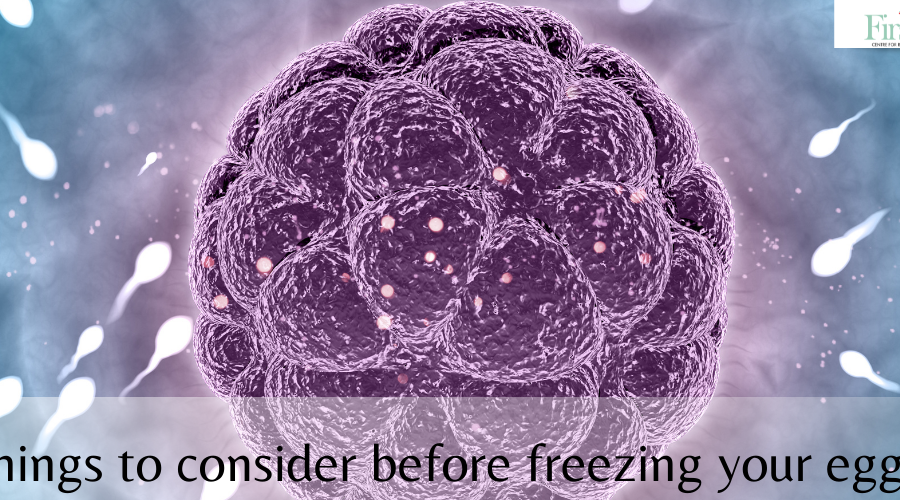Thinking about freezing eggs? Well, then you must have come across information that can rightfully be compelling. So let us discuss some crucial facts about this probable life-altering surgical procedure.
What exactly egg freezing is! In medical terms, egg freezing is a fertility preservation technique where eggs are extracted from the ovaries and frozen, so they can be used for a procedure of reproductive technology, like in-vitro fertilization (IVF), in the future. First Step ivf provides the best egg freezing in Delhi.
- Freezing eggs is not a surety contract.
Remember that fertility changes with age and not all of the eggs you freeze will be viable. Think about the quality and quantity in this situation. Your age while freezing the eggs will determine how many eggs survive the warming process and can be successfully fertilized.
- There is no perfect age to freeze eggs, but there are better ages.
The most favourable time to freeze eggs is between the ages of 20 and 30 when you have a high tendency of ovarian reserve and healthy eggs. Also, if your fertility hormones are tested as soon as possible, they will reveal many facts related to the state of your ovarian reserve.
- The egg retrieval process can be intense.
Your ovarian reserve will be assessed by taking a blood test which eventually looks for infectious diseases. An ultrasound may also be needed to examine overall ovarian function. Then you’ll take synthetic hormones that stimulate your ovaries to grow a cohort of and, simultaneously, medicine to prevent you from ovulating before egg retrieval.
After confirming that your follicles are ready for egg retrieval, a Corsican Gonadotropin Injection will be given for the maturation of the eggs. Moreover, to locate mature follicles, an ultrasound probe is inserted into the vagina. Then a long needle and cord are inserted into the vaginal canal on the ovaries, and then suction is applied to remove the eggs one by one, they are quickly frozen in liquid nitrogen as part of a process called vitrification.
- Chances of side effects.
Everyone’s bodies are different but everyone experiences almost the same type of symptoms after egg freezing which is totally normal and will improve over time:
- Cramps and pain due to the egg retrieval procedure
- Mood swings from all of these hormones
You may want to live free time for the day of egg recovery, but with the procedure, you will probably be able to return to work and resume day-to-day activities in a week. Avoid making life-changing decisions soon after. As a warning, it is also possible to get pregnant after the procedure as there may be eggs that have not been retrieved, so avoid unprotected sex with a partner who has sperm.
The following symptoms are important to watch out for as they may be indications of ovarian hyperstimulation syndrome (OHSS), a fertility drug reaction that promotes ovulation:
- Weight gain • Swelling
The probability of OHSS is now a lot lower than it used to be, thanks to the establishment of identifying risk factors, measuring anti-Mullerian hormone (AMH) levels before using stimulation medications, and individualizing the hormone protocol that prepares you for the egg retrieval procedure.
- Freezing eggs can be a righteous option in case of certain health concerns.
Egg freezing could be a way to preserve your current fertility if you have serious health issues like cancer that require chemotherapy or radiation. You need to have surgery that could damage your ovaries. Moreover, getting to know about your family history of early menopause, Turner’s Syndrome, or a genetic mutation and deciding to remove your ovaries might also be good reasons to talk to your health practitioner at the IVF clinic about whether or not you’re a good candidate for egg freezing.
- Freeze eggs or embryos
Embryos are eggs fertilized with sperm; however, eggs are not fertilized. Freezing your eggs gives you more options, you do not need to know who stops these eggs and you can take the time to discover.
Freezing embryos are useful if you have a partner or a masculine cis donor and that you want to get pregnant through the embryo transfer to an IVF clinic. It is also possible that you end up with more embryos than you would like to use and that you end up confronted with what to do with them, whether you want to discard or donate or want to keep them frozen. What if your relationship ends with the person whose semen was used? What will you do with those embryos?
However, those who survive the freezing come across the same problem, how much will lead to a successful pregnancy that you have to make embryos or eggs. So, ultimately, the answer as to what to do is between you, a partner, and your care team.
- Prior identification can be useful
It’s easy to get overwhelmed when making decisions about your fertility, let alone health care in general. The First Step IVF in Delhi can help you take some real action to get an idea of egg freezing is something you may want to consider. For example, learning what your AMH levels, which indicate your ovarian reserve, are at right now can help you predict ovarian stimulation, that is when you take hormone medication for egg generation or IVF success should let you decide to freeze your eggs and use them later.
Want to know more about fertility, delay no more. Visit the best clinic of IVF in Delhi, the First Step IVF and get in touch with the senior consultation and health practitioner.

